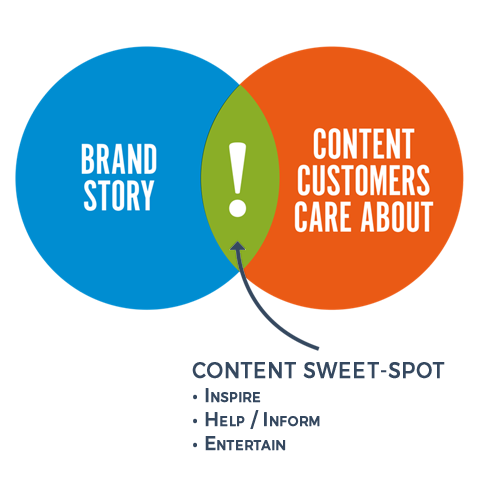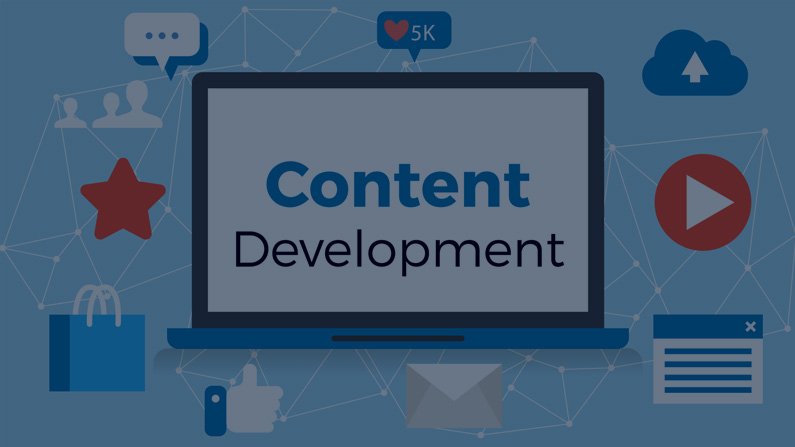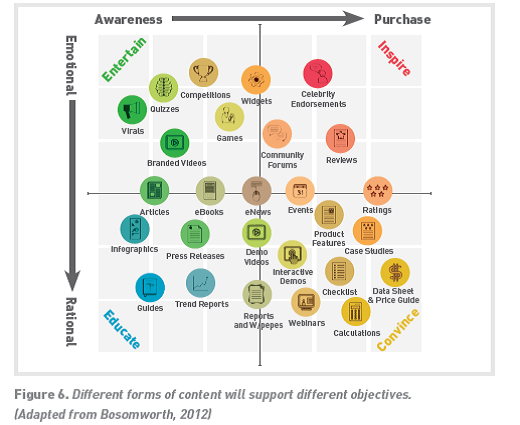Do you feel inundated with all the marketing buzz words, tips, principles, advice, etc., telling you how to improve your content strategy development?
I do!
The amount of marketing buzz the modern marketer has to deal with is growing exponentially, reaching –watch out: ANOTHER buzz word- “big data” proportions. Luckily, our job here at Commetric has always been driven by our trust in solid, deep and practical insights that we strive to deliver to our clients, a proof of which is our most recent AMEC 2016 award for “Most impactful recommendations arising from a measurement study”.
In such a ‘data-intensive” environment, leaning on fundamental truths can help us revisit our content marketing tenets and reconsider our content marketing strategies. And we certainly need to do that from time to time.
 Context, Not Content, Is King in Digital Marketing
Context, Not Content, Is King in Digital Marketing
In her article Context, Not Content, Is King in Digital Marketing, Kim Garst (@kimgarst) highlights that even high-quality content can deliver little or no value if not provided in the proper context. Hence, the importance of context marketing, which she defines as “the practice of knowing your audience so well that you know what knowledge, products or services will be incredibly valuable to them. No fluff, no muss, just VALUE.” And she goes on to give the answer to the fundamental question
How do you know your customer?
Or at least part of the answer: by engaging them on social media! But then if we continue asking “How?”, things start to get into the domain of marketing buzz, i.e. lots of tips and concepts with no practical value. Still we want practical and actionable insights that can hardly be gleaned through social listening alone:
How do we obtain that context-specific data about our audience which will help us understand their interests, needs and challenges so that we give them exactly what they want?
Giving a simple, yet correct answer to this question is already a quantum leap! But there is one and it is called Facebook topic data. While you may be doing the ubiquitous social listening on brand pages (as you cannot collect or see any information from personal posts), Facebook topic data is for analyzing the entire ‘Facebooksphere’ (by analogy to Twittersphere), it is a sort of a magic bullet for finding out what drives engagement among its 1.6 billion members.
 Brands Should Stop Trying to Be Publishers
Brands Should Stop Trying to Be Publishers
In a not so recent Adage article of the same name, Ben Elowitz(@elowitz) exclaims:
“If buzz implies truth, then there is no doubt about it: Every brand must be a publisher. It’s the mantra for advertising in this social age”.
Countless articles and blogposts on the net cite examples of brands effectively operating as publishers leaving us under the false impression that our brand is still seriously lagging behind this overriding content marketing trend. But the truth is that the examples of Red Bull and Virgin are the exceptions rather than the rule. However, as Elowitz points out, one of the premises of the “brands must be publishers” mania is more valid than ever: Brands do need to earn a spot on consumers’ radar. And to do that you need to find the content sweet spot that will inform, inspire or entertain your customers and at the same time help you tell your brand story.
 Credit: adamlewis.info
Credit: adamlewis.info
You certainly can’t produce all that content in-house due to various reasons, and you surely don’t need to because there is another way to bring great content to your customers: Become a curator! It’s faster, cheaper and lets other people take the blame. After all you don’t measure success based on engagement the way publishers do; you measure success based on sales.
Finally, in order to have an easy framework incorporating all of the above, here comes the third fundamental truth:
 Shift Your Focus from the 4Ps of Marketing to the 4Cs of Social
Shift Your Focus from the 4Ps of Marketing to the 4Cs of Social
Although the 4Cs framework comes in various configurations, here we offer our version, which nicely summarizes the four key pillars/steps you need to address when developing your content marketing strategy:
Context: Research your customers’ Context through Facebook topic data.
Content: Based on the context research, find the Content sweet spot that will reflect your brand essence
Curation: Curate different content formats based on your Content marketing objectives. For example below Content Matrix can help you select the right format based on objectives
Community: Create a community around your brand/product/service with the following structure





Posted a VERY similar blog yesterday on LinkedIn. I am with you. Context and Content go hand and hand.
https://www.linkedin.com/pulse/content-vs-context-fallacy-debate-toby-reed